Story by Michelle Sutton; photos courtesy of Bergen Water Gardens and Nursery
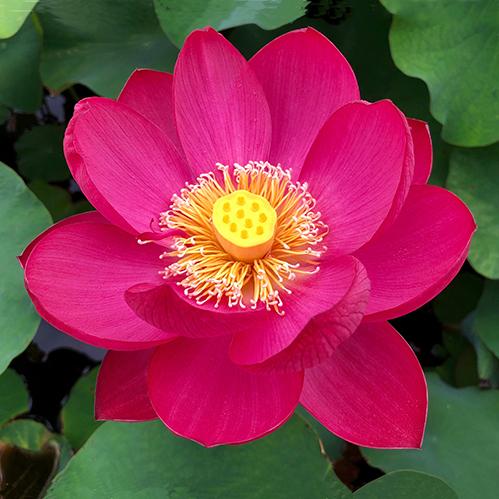
Halfway between the Villages of Bergen in Genesee County and Churchville in Monroe County lies Bergen Water Gardens and Nursery (hereafter, “Bergen”), where spouses Larry Nau and Lili Liu are growing the largest collection of lotus in the world outside of China. Their property is sixteen acres—and currently they are only using a fraction of that to grow their 400-plus varieties of lotus. “Lili would like the entire sixteen acres to be lotus,” Nau says, smiling. “We do have a lot of energy, and the business has grown significantly in the last five years, so maybe that will come to pass.”
The nursery has an extensive collection of carnivorous plants as well—oh yes, and waterlilies and orchids and dwarf conifers. Lotus and carnivorous plants are in the biggest demand now at Bergen—more about those in a minute. “Apart from not being able to travel to China as we typically do, the past year has actually been good for our business,” Nau says. “As people are spending more time at home, they’ve been looking for new things to grow.” Bergen has a beautiful user-friendly website, does extensive mail order, and welcomes in-person visitors.

Larry Nau grew up in Spencerport and went to Churchville-Chili High School, then attended the University of Rochester in the late 1970s, where he studied biology and anthropology and began collecting orchids. While a student, he connected with a biology professor who specialized in alga, which fed Nau’s then-nascent interest in plants; and a medical anthropology professor, who helped Nau get interested in world travel. During his time in school, Nau joined Crossroads Africa, a Peace Corps–like program that actually predated the Peace Corps, and was assigned to Liberia. “Our assignment was supposed to be medical in nature,” he says, “but when we got there, the most pressing need was for a construction crew to rebuild the Hope School for the Deaf in Monrovia.”
While in Africa, Nau travelled to Sierra Leone and to Ghana, and after graduation, he took a research assignment in Malawi studying cichlids, tropical fish that originate in the lakes of central Africa and are a food source for the region. Nau had collected cichlids and other tropical fish throughout his childhood and was a scuba diver, so he was a good fit for the study. He logged 150 hours in Lake Malawi, studying the cichlids and trying not to be trampled by hippos. “We divers hugged the bottom of the lake so as not to get between mama and baby,” he says. With this second sojourn in Africa, Nau was fully hooked on international travel and over the years has visited Thailand, Australia, Papua New Guinea, and China.
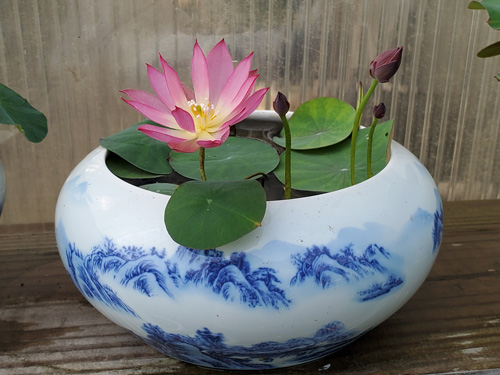
‘Colorful Lantern in Quinhai’ is one of Bergen’s bestselling micro lotus 
Larry Nau and Lili Liu shortly after marrying, traveling in the Gobi Desert of Northeastern China 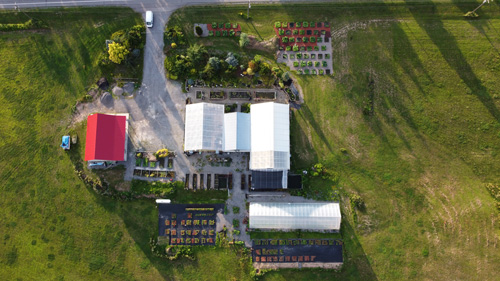
Aerial view of Bergen Water Gardens & Nursery, taken by Larry Nau’s drone 
Jewels of a pond: koi at Bergen
During college, Nau began his career at Pet World, which had ten privately-owned stores in New York, from Buffalo to Saratoga Springs. “In the late 1970s, ponds became a thing,” Nau says. “My background with fish and plants helped make me Pet World’s go-to person for all things ponds, and I focused on providing the stores the best selection of fish from around the world.” Nau spent forty-one years with Pet World as its livestock buyer and district manager, while simultaneously building up Bergen Water Gardens and Nursery on the land he purchased with his first wife, Sherry.

As Nau grew his business, he got increasingly involved with the International Waterlily and Water Gardening Society (IWGS) and served as its executive director from 2009 to 2011.
Nau also became president of the Northeast region of the American Conifer Society (ACS) from 2012 to 2014. Through these positions he made meaningful domestic and international connections in the plant world. He gained experience with organizing symposia in Thailand and China for botanical garden directors, horticulturists, and other serious waterlily and lotus collectors and aficionados. These friendships and contacts continue to enrich his life.
Then came the carnivorous plants, starting with trumpet pitcher plants (Sarracenia spp.) for floating islands in ponds or elements of bog gardens. “I had maybe 20 different varieties of Sarracenia for a long time, but eventually I got more interested in tropical pitchers plants (Nepenthes spp.)—carnivorous plants from Asia,” Nau says. “I imported them, learned to grow them, and now we have one of the better collections in the U.S. Later this year we plan to build our sixth greenhouse, just for the Nepenthes.” Bergen also sells sundews (Drosera spp.), and butterworts (Pinguicula spp.); many of their carnivorous plants can be grown as houseplants on a window sill. Bergen grows more than 25 varieties of Venus fly traps (Dionaea muscipula), highlighting distinctive growth types, colors, and teeth characteristics.
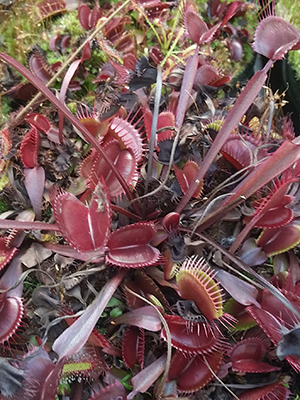
‘Red Dragon’ Venus fly trap 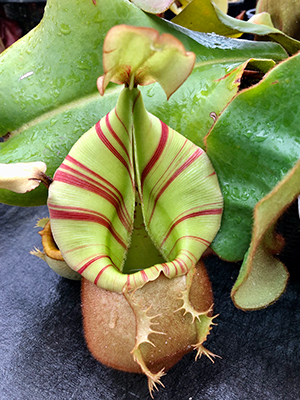
Nepenthes veitchii ‘Candy Stripe’ 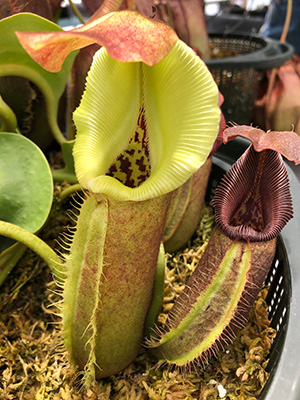
The carnivorous Nepenthes robcantleyi shows interesting color variation 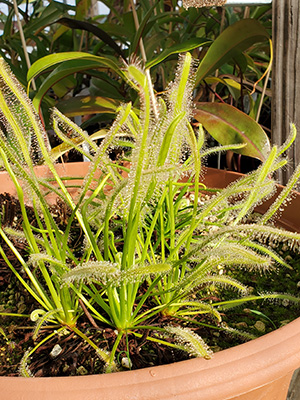
Cape sundew (Drosera capensis) is an easy-to-grow carnivorous plant

In 2016, Nau’s personal life and business thrived when he and Lili Liu married. Liu had been an accountant in China; when she came to Bergen, she joined the business seamlessly, bringing to it her business skills, love of people, an energy level to match her husband’s, and the ability to speak Mandarin, Cantonese, and Chaozhou. “I handle most of the purchasing and wholesale side of things, while Lili handles most of the social media, marketing, and retail interactions,” Nau says. “She also corresponds with hybridizers aroundChina on WeChat and other platforms.” Typically, Nau and Liu travel to China several times a year to survey plant varieties, meet growers, and make purchasing arrangements. He and Liu sell all over the U.S. and to customers in Italy, Germany, India, Denmark, and Russia, among other countries.

“About three years ago we imported the first micro lotus, and now that’s the most searched for plant on our website,” Nau says. Micro lotus are compact—just six to eight inches tall—and you can grow one in a six-inch pot on a balcony if you live in an apartment. You can move a micro lotus inside for a few days at a time when it’s blooming, then get it back out into the light, then bring it back in. “We have about 50 cultivars of micro lotus and plan to expand our exhibit to over 100 pots this year,” Nau says.

‘Jade in Jinling’ lotus 
The coveted “Black Red” lotus introduced at Bergen in late 2020 can be seen and recognized by lotus-savvy visitors from more than 100 feet away 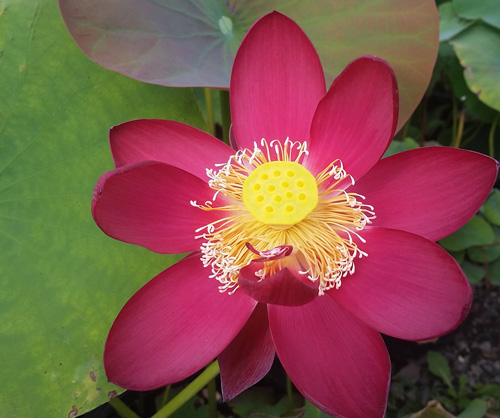
The ‘Chinese Red Beijing’ lotus begins blooming in early June and flowers for about 70 days 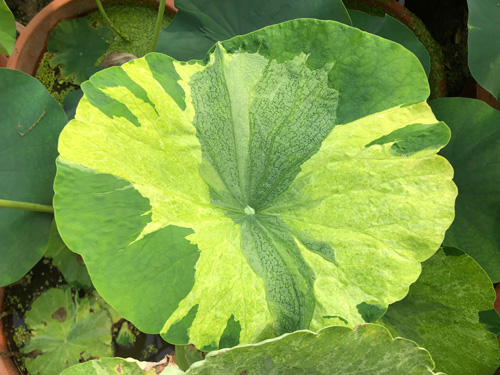
Bergen was given exclusive marketing rights to this variegated-leaf lotus, ‘Gold Splash Hibiscus’
One particularly exciting member of the Bergen horticultural collection is the trade’s first variegated-leaf lotus—Nelumbo ‘Gold Splash Hibiscus’. It was found in China in 2016 by a propagator-colleague as a mutation within a group of stock pink lotus, and Bergen was given exclusive marketing rights to the cultivar. According to Nau, the variegation on propagules from the mother plant (the plant is propagated by tuberous division) has remained stable. The ‘Gold Splash Hibiscus’ lotus has a double pink flower, five inches in diameter. The flower’s shape and appearance is reminiscent of that of hibiscus, and the plant reaches 19 to 24 inches high, with leaves that are 10 inches in diameter.
The “Black Red” lotus is a new introduction for 2021 from China. “We are the first to offer it to the international water gardening community, and it has created much excitement,” says Nau. “In general, Chinese visitors remark about how good our red-flowering lotus look—something about our soil, perhaps, or the fertilizer we’re using, is yielding a deep color.”
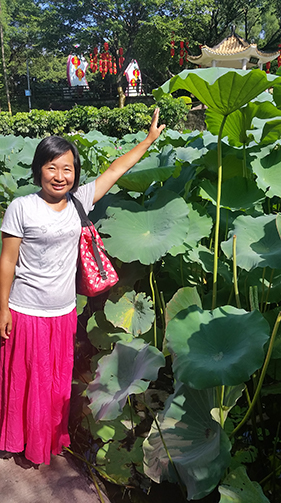
Lili Liu at Lotus Mountain in Guangzhou, China. 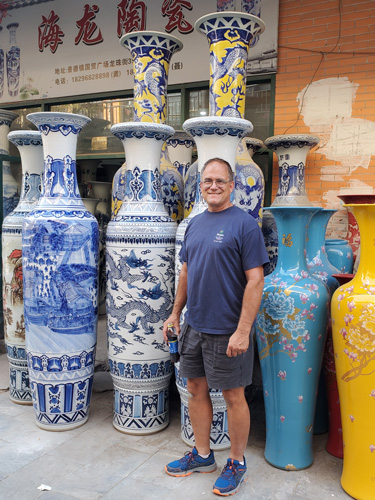
Larry Nau in Jingdezhen, China, outside the pottery studio that supplies much of Bergen’s offerings.
MORE BERGEN AND LOTUS HIGHLIGHTS
– The growing operation and the displays at Bergen are ambitious. In addition to five (soon to be six) greenhouses, Bergen has 65 five-by-five-foot mini-ponds for lotus and three natural growing areas that are 25 by 100 hundred feet each. Bergen sits at about the same latitude as the places in China where lotus grows naturally; blooming begins in late June and early July. The red cultivar ‘Magnificent’ is always the first to bloom for Bergen, and lotus generally bloom to the middle to end of September.
– After the Lunar New Year (February 12 in 2021), Nau, Liu, and a helper begin harvesting lotus tubers from plants produced in pots, cleaning and sterilizing them, and shipping them out. So, February and March can actually be the busiest time of the year for Bergen, which also imports more than 6,000 tubers annually from China.
– In 2021, the annual Bergen Water Gardens and Nursery LotusFest will be the weekend of July 31–August 1. It’s Bergen’s celebration of the beauty of lotus, with thousands of lotus flowers on display and, most years, lotus chips and lotus pizza available for tasting.
– “Lotus Paradise at Bergen Water Gardens & Nursery” refers to the first International Waterlily and Water Garden Certified Nelumbo Collection of Excellence, made up of 80 of the 400-plus varieties at Bergen.
– Nau served as the task force chairperson for the creation of the Thai International Waterlily Collection at King Rama IX Public Park in Bangkok, Thailand, unveiled during the IWGS symposium in July, 2007. More than 18 renowned hybridizers and growers contributed more than 110 historically significant varieties of hardy and tropical waterlilies to the collection, which was presented as a gift to mark both King Bhumipol Adulyadej’s 80th anniversary and the 20th anniversary of the park. You can read more about this remarkable endeavor at iwgs.org.
– A future avenue for the business may come from the edible nature of most lotus seeds, stems, leaves, flowers, and tubers. Nau explains that lotus—especially the tuber—is a staple food throughout China, Southeast Asia, and India. “Lotus tubers look like sausages linked together, with unique air passages on the inside,” he says. “Once harvested, washed, and peeled, the lotus tuber may be sliced, boiled, or stir-fried. The tuber has a mild flavor with a crisp texture. Lotus are cooked with other vegetables, pickled in vinegar, or candied as a dessert.” He envisions a growing demand for edible lotus, but also has been contacted by New York City–based businesses who want to come to Bergen to do photo shoots for face creams and other lotus-based products. (As Nau explains, it’s cheaper for crews from NYC to come to Churchville, New York, than to fly to China.)
– There are silky strands in lotus stems that can be used to make textiles.
– The lotus plant has significant religious and cultural meaning for many of the world’s peoples.
– Find Bergen Water Gardens and Nursery at bergenwatergardens.com.
Michelle Sutton is a horticulturist, writer, and editor.
Views: 0




